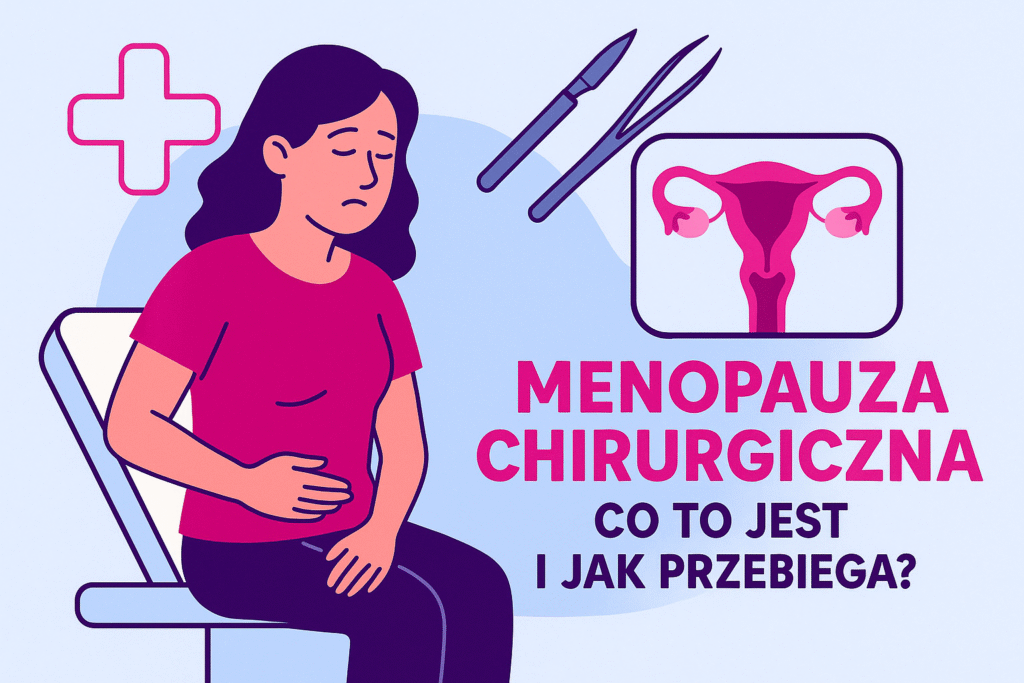Surgical menopause refers to menopause that is induced artificially—most commonly due to the removal of the ovaries. Unlike natural menopause, this process happens suddenly and abruptly, and hormonal symptoms often appear immediately after surgery. This situation requires a different approach to treatment and support than natural menopause. In this article, we explain what surgical menopause is, when it occurs, what effects it brings, and how to manage them.
What is Surgical Menopause?
Surgical menopause occurs after the removal of both ovaries (bilateral oophorectomy), regardless of a woman’s age. It can also result from a hysterectomy if the ovaries are also removed or stop functioning properly due to the procedure. It is often performed in cases of:
- ovarian, uterine, or cervical cancer
- treatment-resistant endometriosis
- ovarian cysts or fibroids
- as a preventive measure in women with BRCA1/BRCA2 mutations (high risk of ovarian and breast cancer)
The result: a sudden stop in the production of estrogen and progesterone — without the transitional phase that occurs in natural menopause⁽¹⁾.
Symptoms of Surgical Menopause
Symptoms usually appear within days of the surgery and may be more intense than in natural menopause:
- sudden, severe hot flashes and night sweats
- vaginal dryness, decreased libido, pain during intercourse
- mood swings, irritability, anxiety, depression
- sleep problems and difficulty concentrating
- joint pain, fatigue
- rapid loss of bone density and risk of osteoporosis
- increased risk of cardiovascular and metabolic diseases⁽²⁾
The younger the woman, the higher the risk of complications due to hormonal deficiency — especially if appropriate treatment is not implemented.
Treatment and Support After Surgical Menopause
1. Hormone Replacement Therapy (HRT)
HRT is the standard of care for younger women after ovary removal, provided there are no oncological contraindications.
- it should be initiated as soon as possible after surgery
- typically includes estrogen + progesterone (if the uterus is intact)
- if the uterus is removed, estrogen alone may be used
- the goal is not only symptom relief but also protection of the cardiovascular, skeletal, and nervous systems⁽³⁾
2. Supportive Medications and Therapies
- local vaginal estrogen (for dryness and infections)
- antidepressants (SSRI/SNRI) – for severe mood disorders
- calcium, vitamin D, and omega-3 supplements
- urogynecological physiotherapy (to prevent urinary incontinence)
3. Psychological Support
For many women, sudden menopause is a difficult emotional experience — linked to loss of fertility, femininity, and fear of cancer. Recommended support includes:
- therapy or counseling
- joining support groups for women after oophorectomy
- education and open conversations with doctors, partners, and family
Life After Surgical Menopause
Although surgical menopause may seem overwhelming, early treatment and lifestyle changes can help maintain a high quality of life. Key strategies include:
- regular physical activity (strength and aerobic exercises)
- an anti-inflammatory diet rich in calcium
- avoiding smoking and excessive alcohol
- regular health checkups (bone, heart, hormones)
For women with BRCA mutations, the decision to remove the ovaries is difficult but significantly reduces the risk of ovarian and breast cancer — it does not mean the end of life, but a new phase that can be approached mindfully and safely⁽⁴⁾.
Summary
Surgical menopause is an intense physiological and emotional experience that requires special care. Proper hormone therapy, emotional support, and lifestyle adjustments can alleviate symptoms and prevent long-term health consequences. The key is early diagnosis, personalized care, and openness to both medical and emotional support.
References
- Rocca WA et al. Long-term effects of bilateral oophorectomy on brain aging and Alzheimer’s disease risk. JAMA Neurol. 2014.
- Parker WH et al. Oophorectomy versus ovarian conservation with hysterectomy: effect on long-term health. Obstet Gynecol. 2009.
- L’Hermite M. Bioidentical menopausal hormone therapy: registered hormones (nonoral estradiol ± progesterone) are optimal. Climacteric. 2017.
- Rebbeck TR et al. Prophylactic oophorectomy in women with BRCA1 or BRCA2 mutations. N Engl J Med. 2002.

